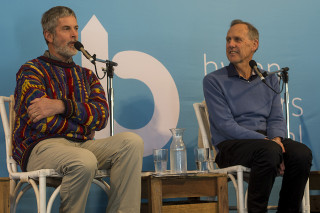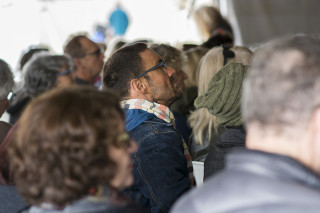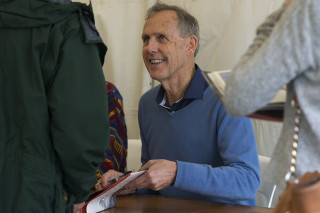Green Nomads: across Australia’s wild heritage

There is a good chance that many of us will never experience all the sights that the Australian outback has to offer, except in pictures.
Out there, in the seemingly untouched country, incredible natural wonders and awe-inspiring landscapes hide a host of native animals and plants which, against all odds, manage to thrive in places where so few humans have been able.
The fact that so many will miss out on this is exactly the reason that Bob Brown, former Greens leader and veteran environmental activist, wrote the book Green Nomads after taking three-months of service leave to travel Australia.
Brown’s partner of 21 years, Paul Thomas, accompanied him on the journey, taking pictures and discovering the land and its stories. Neither are strangers to the bush, having grown up there and having dedicated so much time to preserving the natural beauty of Australia and the planet as a whole.
Today’s panel, Green Nomads: Across Australia’s Wild Heritage, was chaired Ashley Hay, journalist and author of The Railwayman’s Wife. Hay professed that she had always wanted to write a piece on Brown where she could compare him to the Lorax, as he ‘speaks for the trees.’

Hay asked when did Brown began to realize the importance of nature and preservation of nature, and he told a story of when he was a child and he picked flowers from outside for his mother.
When he brought the flowers to his mother, she very gently said thank you and put the flowers in a vase, but told him that the flowers are a lot nicer in the ground where they can live.
As Brown said, it illustrates, ‘not just a physical divorce from nature, but a mental and spiritual divorce’.
I think this concept is at the core of this journey that Brown and Thomas have shared with us. As humans continue to take from the Earth, we give little thought to what we are leaving behind. The focus is on possession of earth rather than the cultivation and protection of it.
This intimate view of Australia’s outback, which so sensitively acknowledges that the land Australians see have traditional owners who have cared for it and who have a right to keep it, was also a call to activism. As Brown told funny stories and Thomas dished out witty remarks, they also threw out harsh criticism directed as those who have shown little respect for the environment.
This included a scathing remark about miners BP, who are currently moving a $750 million oil rig into the Great Australian Bight to conduct activity similar to that which caused the leak in the Gulf of Mexico in 2010. The aftermath of that leak is still ongoing, even six years later, and has permanently destroyed the aquatic life around the US Gulf Coast.
So where do we go from here?

Brown himself said that he’d love to have a cabinet meeting somewhere like the Tarkine Trails, which his organisation Bush Heritage Australia is trying to restore to its original custodians. But barring that, what can the average person do for the environment when politicians refuse to acknowledge the problem that is rapidly escalating?
Brown suggests that ‘sustainability’ is overdone. After all, there is now talk of things like ‘sustainable oil extraction’ – implying it was an oxymoron – rather than talk of putting resources into renewable energy alternatives. Brown prefers the term ‘prosperity,’ as it better represents what Australia needs.
I like the term prosperity. Prosperity, as Brown explained, means sharing must be central in the vocabulary and actions of humanity. We can bolster programs such as foreign aid, focus on helping others, and learn that there is no need to take in excess just to provide for oneself. Thomas suggested that at its very basic level, it means not letting ourselves be overcome by greed.
It’s something we can all strive for if we want to do right by Australia – and the planet.
Report by Megan A. Morgan, a Writing/Visual Arts student at Southern Cross University. Originally from Massachusetts, she holds a prior degree in English from Umass Amherst.
